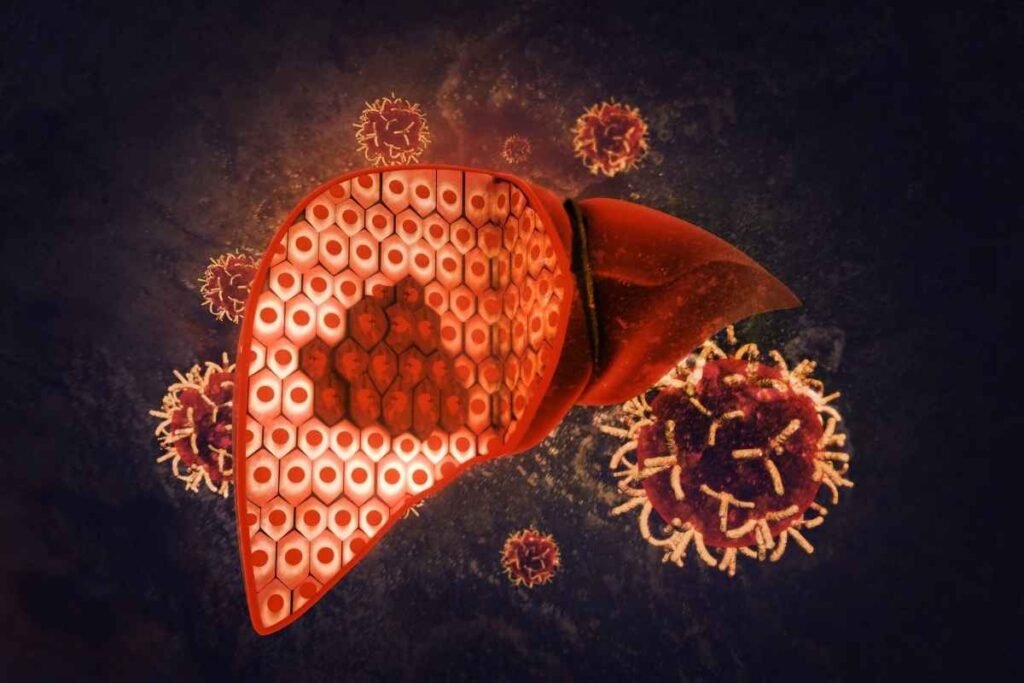Introduction:
Polycystic ovary syndrome (PCOS) is a common condition that affects hormones, periods and ovulation. Many people with PCOS also have insulin resistance, inflammation and a higher risk of fat buildup in the liver (called nonalcoholic fatty liver disease or NAFLD). Silymarin — the active extract from milk thistle seeds — is a herbal compound often used to support the liver and reduce inflammation. This article explains what silymarin is, how it may help the liver and how it could be useful as part of care for people with PCOS.

What is silymarin:
Silymarin is a group of plant compounds found in the seeds of the milk thistle plant (Silybum marianum). The most studied components are silibinin (also called silybin), silychristin and silydianin. People have used milk thistle for hundreds of years to help the liver. Today, modern extracts concentrate silymarin because research shows it has antioxidant and anti-inflammatory actions that protect liver cells.
How silymarin helps the liver:
Antioxidant and cell protection:
Silymarin works as an antioxidant — it helps neutralize free radicals that can damage liver cells. It also supports protein production in liver cells, which may help repair and rebuild damaged tissue. These effects make silymarin useful to study for conditions where the liver is stressed. NCCIH
Reducing inflammation and scarring:
Inflammation is a key driver of liver damage. Silymarin has anti-inflammatory effects that can lower chemical signals that cause liver harm. Some research also suggests silymarin may slow fibrotic changes (scarring) when used alongside other treatments. These actions form the biological reason researchers test silymarin in fatty liver disease and chronic liver conditions.
What research shows for liver disease:
Clinical trials and reviews give a generally positive but cautious picture. Multiple randomized trials and systematic reviews report that silymarin can lower liver enzymes such as ALT and AST — markers that often fall when liver inflammation improves. A recent systematic review and meta-analysis found benefits of silymarin for patients with NAFLD and other chronic liver problems, but the authors also noted that more high-quality trials are needed to confirm how large and lasting the benefits are. In practice, silymarin is best seen as a supportive therapy, used with diet, exercise and medical treatment rather than as a replacement for them.

Why silymarin is of interest in PCOS:
PCOS involves hormonal imbalance (often raised androgens), insulin resistance, and chronic low-level inflammation. These problems can affect the liver: for example, insulin resistance increases the chance of NAFLD in people with PCOS. Because silymarin lowers inflammation, acts as an antioxidant and may improve some metabolic measures, researchers have tested whether it can help PCOS symptoms or the metabolic problems that often come with it.
What the evidence says for PCOS:
Animal and lab findings:
In animal studies, silibinin has been shown to reduce ovarian inflammation, lower androgen-related signals and improve insulin-related markers. These findings give a biological basis for testing silymarin in humans with PCOS.
Human studies so far:
Human research is limited but encouraging. Small clinical reports and trials have combined silymarin with standard treatments (for example, metformin) and found improvements in oxidative stress markers, some hormone measures and even ovulation or IVF outcomes in small groups. However, these human studies are few, often small, and sometimes use different doses or product types. That means silymarin may be a helpful adjunct for some people with PCOS, but it is not yet proven as a primary treatment. More large, well-designed trials are needed.
Also Read: Saw Palmetto & Natural Androgen Control: Hair & Acne Strategies
Practical dosing and product quality:
Typical trial doses:
Clinical trials have used a range of doses. A commonly used regimen in trials is about 140 mg of standardized silymarin extract taken three times daily (roughly 420 mg/day). Other studies use total daily doses between about 200 mg and 600 mg. Product formulation, purity and standardization vary, so it matters to choose a product that lists the amount of silymarin (or silibinin) per dose.
Choosing a quality product:
Because supplements are not regulated the same way as medicines, look for brands that state they are standardized for silymarin and that have third-party testing (for example, USP, NSF or similar). Speak with your healthcare provider about brand choice if you are unsure.
Safety, side effects and drug interactions:
Silymarin is generally well tolerated. The most common side effects are mild: stomach upset, diarrhea, headache or skin reactions. Important safety notes:
• Drug interactions: silymarin can affect liver enzymes that process drugs, so it may change blood levels of some medicines. Talk to your clinician if you take blood thinners, hormonal drugs, antidiabetic medicines, or other long-term drugs.
• Blood sugar: silymarin can lower blood sugar in some people. If you have diabetes or take blood sugar–lowering medicines, monitor glucose closely.
• Pregnancy and breastfeeding: data are limited. Because safety data are not strong, pregnant or breastfeeding people should consult their healthcare provider before using silymarin.
How silymarin can fit into a PCOS care plan:
If you are considering silymarin for liver support or as part of hormone care in PCOS, follow these sensible steps:
- Discuss it with your clinician, especially if you take other medicines.
- Use silymarin as an adjunct — do not stop prescribed treatments such as metformin, hormonal therapy or fertility care.
- Monitor: check liver enzymes and blood sugar before starting and after starting a supplement that affects the liver or glucose.
- Check product quality and choose a standardized extract.
- Stop and seek medical advice if you get new symptoms such as rash, severe stomach upset, yellowing of the skin, or unusual bleeding.
Final summary:
Silymarin (milk thistle) has antioxidant and anti-inflammatory properties that can protect and support the liver. Evidence from trials and reviews suggests silymarin may improve liver enzyme tests in conditions such as NAFLD, and early studies (animal and small human trials) suggest potential benefits when used alongside standard care in PCOS. However, human evidence for direct hormone effects in PCOS is still limited, so silymarin should be used as a supportive, not primary, therapy. Always discuss supplements with your healthcare provider, check product quality, and monitor liver tests and blood sugar during use.
References:
National Center for Complementary and Integrative Health (NCCIH) — Milk Thistle
Mayo Clinic — Milk thistle (drug and supplement information)
Li S et al. 2024 systematic review / meta-analysis of silymarin in NAFLD/NASH (PubMed)
Marouf BH et al. 2022 Therapeutic effects of silibinin in PCOS (PMC article)
Najdi N et al. 2017 study on silymarin effects in PCOS patients (Pharmacophore journal)

